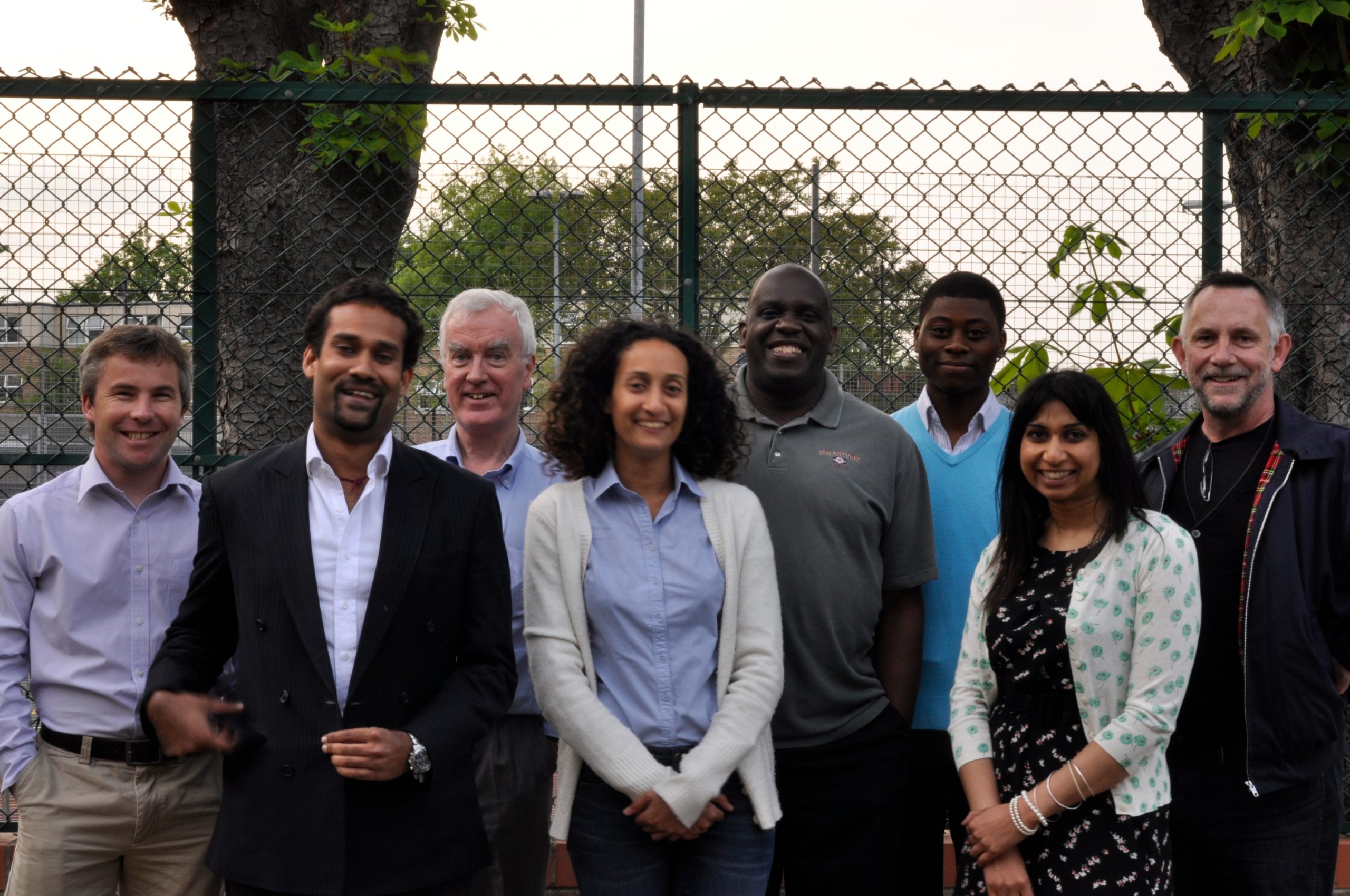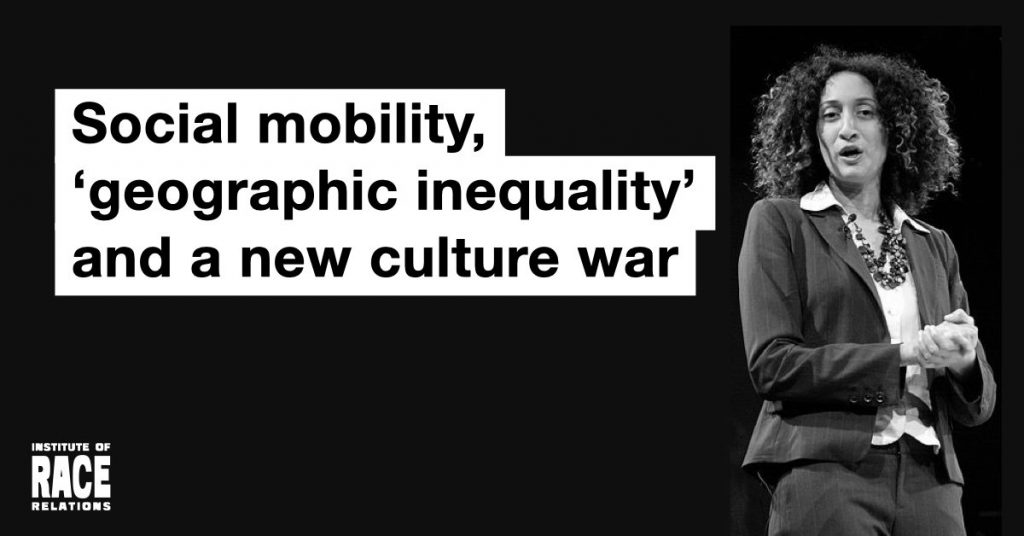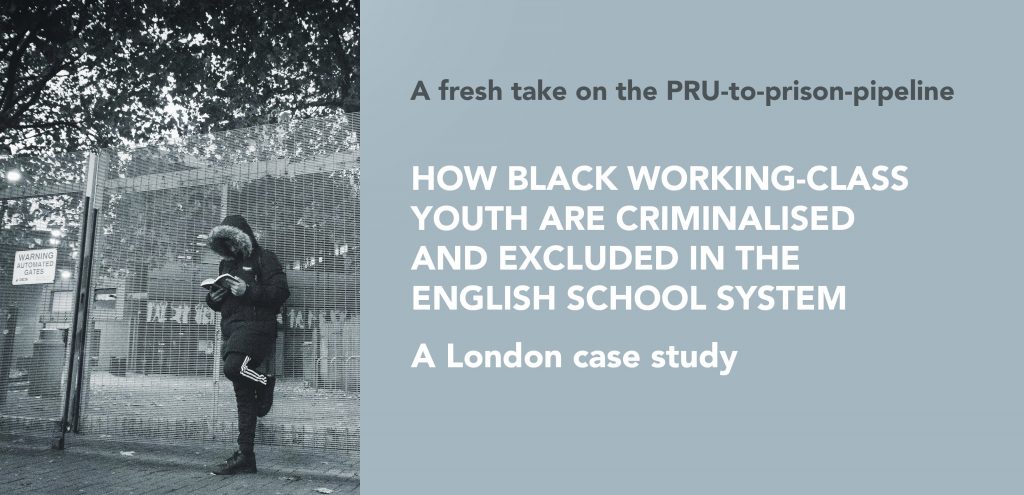As a new head of the Social Mobility Commission is appointed and the government pursues its ‘levelling up’ agenda, IRR researcher Jessica Perera debunks simplistic and racialised messages around ‘geographic inequality’.
Discussion about social mobility is all the rage in government circles, but only if it is linked to its programme of ‘levelling up’, with educational attainment emerging in policy circles as the key indicator of social mobility. Economic inequality, social exclusion and obscene poverty are manifest across every social sector – not just education, but housing, employment, welfare. And they are just as stark in the big multicultural conurbations as in smaller northern towns. Yet, despite this, ‘levelling up’ conjures up a UK map which centres the northern towns as the site of the ‘left behind’ in contrast to a seeming cosmopolitan elite in London. If we go back over policy announcements and discussion papers since at least 2017, we can begin to see how this has come about. Gradually, the use of terms such as ‘geographic inequality’ or ‘geographic disadvantage’ has both distorted discussions on deprivation and cemented racialised discourses in popular debate.
The SMC, ‘unfair advantage’ and ‘the new fight for fairness’
The first intervention to consider is former education secretary Justine Greening’s in the 2017 publication Unlocking Talent, Fulfilling Potential: A Plan for Improving Social Mobility through Education. In it, Greening laid out the basis of the government’s new approach to ‘geographic inequality’, arguing that a superior siloed education network of good and outstanding free schools, academies and better teacher training, meant that even poor pupils in London had an unfair advantage in terms of social mobility than pupils outside the capital. Following on from this, and particularly after the election of Boris Johnson in 2019, the ‘unfair advantage’ idea has been further refined via the attacks on the Equality Act 2010, which is presented as inimical to white working-class progress.
Questions are now being asked about the future impartiality of the Social Mobility Commission (SMC) and whether it will become more ideologically linked to government culture wars under new chief Katharine Birbalsingh, described in a Guardian editorial as an ‘evangelist for a distinctive disciplinarian ethos’. The SMC is an advisory non-departmental public body, which was set up by David Cameron and until recently reported to the Department of Education. Considered a thorn in the side of government under its previous head Alan Milburn, in April 2021, the SMC was moved to the Cabinet Office, to ensure, according to a government statement, that there would be ‘increased influence and leverage in addressing social and regional inequality’. Until the recent cabinet reshuffle, Liz Truss as minister for Women and Equalities and head of the Equality Hub, which sponsors the SMC, was at the helm. No stranger to the promotion of culture wars herself, it was Truss who cemented the new approach through further emphasising ‘fairness’ over ‘favouritism’. In a speech at the Centre for Policy Studies in December 2019, Truss announced a ‘new fight for fairness’ which would abolish the alleged favouritism that emerged since the passing of the Equality Act in 2010. According to Truss, fairness has been limited ‘to the nine protected characteristics laid out in the Act’, instead she wanted to see ‘equality rooted in Conservative values’ which she claimed would not ‘overlook socio-economic status and geographic inequality’.

- Liz Truss. Credit: Leon Neal, Reuters
It’s certainly hard to take Truss’s concern about both ‘geographic inequality’ and socio-economic status (ie, class) seriously when the economic policies, including shrunken education budgets and the recent cuts to universal credit ensure there is no chance that poor areas and people will be ‘levelled up’ under Boris Johnson. The irony is that the government seemingly now wants to level up what it has levelled down for ten years. These are the facts that Truss and others choose to ignore. Instead, it could be argued that they are using a coded language (‘fairness’ and ‘favouritism’) as the dog whistle to pit one group against another.
Making race explicit
Two other inquiry reports, namely the Commission on Race and Ethnic Disparities (CRED) report sponsored by the Race Disparity Unit of the Cabinet Office, and the House of Commons Education Select Committee report The forgotten: how white working-class pupils have been let down, and how to change it, are further indications of the line of travel. The methodology of the CRED report has been widely critiqued, as has that of the Education Select Committee (ESC), the findings of which were a gross misreprese tation, according to educationalist David Gillborn, not least the false equivalence made between ‘white working-class’ and white children on free school meals (a much narrower category). Both reports reveal a continuity with the approach first outlined by Greening in her 2017 plan (see above). Like Greening, the report of the Conservative-dominated Education Select Committee, rejected by Labour members and described as a ‘disgrace’ by Kim Johnson, classed educational opportunity, not poverty, as the prime cause of a lack of social mobility. However, what was new was the explicit connection made between ‘geographic inequality’ and race, with the claim that poor white children underperformed compared with other disadvantaged groups, because ‘an industry’ has emerged to support disadvantaged non-white pupils, while the same level of support is not available to white pupils on free school meals, who underperform at every level of the education system from early years through to higher education.
Social exclusion in London – ignoring the evidence
Reading between the lines of both reports, then, one would be forgiven for thinking that not only do poor pupils in London have an unfair advantage over poor children in the northern towns, but specifically, ethnic minority children are somehow super-privileged through the added support of an aggressive and proactive race industry. The absurd conclusion that all social mobility success stories are in London and the south-east (see CRED p39 and ESC p27), can only be reached by ignoring all the evidence of disproportionate school exclusions (including ‘multiple fixed-term’ and ‘permanent’), particularly of black Caribbean children, from London schools as well as the establishment of a separate education system comprised of Pupil Referral Units and Alternative Provision.
Any evidence which shows that strong educational achievements amongst ethnic minorities in London does not actually translate into upward social mobility is simply ignored. For example, in 2020, the London Mayor’s Office conducted some data analysis of the Social Mobility Index created by the SMC. It found that:
‘when comparing how young people in London’s boroughs perform at different life stages compared to other English local authorities, the story is clear. Most notably, while young Londoners perform well at secondary school age, by adulthood, outcomes in London are much worse than the average… Strong academic outcomes do not appear to correlate with indicators of a good quality life in adulthood. Excellent academic progress does not necessarily grant social mobility.’
In a 2019 report the Social Mobility Commission found that just 17% of London’s professional jobs are occupied by people from working class backgrounds compared to 30% nationally. Similarly, a study by sociologist Sam Friedman in 2017 found that ‘those living in Inner London have experienced the lowest regional rate of absolute upward mobility, the highest regional rate of downward mobility, and a comparatively low rate of relative upward mobility into professional and managerial occupations’. Finally, even for ethnic minority groups across the UK, Ipsos Mori, on behalf of the Social Mobility Commission, found in 2020 that:
‘Some BAME groups, especially those born outside the UK, are much more likely to experience downward mobility, even after accounting for their educational qualifications and other individual characteristics. Ethnic minorities born outside the UK, particularly those from Bangladeshi, Black African and Other Asian backgrounds, and men from Pakistani, Mixed and Other backgrounds were about 10–20 percentage points more likely to experience downward mobility than White British workers. Their qualifications were often not recognised in the UK, or they experienced discrimination and unfair treatment at the workplace preventing them from progressing further.’
To put all this another way, the evidence shows that ethnic minorities face discrimination and racism in employment, rendering their educational achievements redundant.
The real reasons why social mobility is stagnating
In this way, we can see how the government misleads the public on the linked issues of ‘geographic inequality’ and social mobility. It has done this by creating a simplistic story about the white working-class child, seen to be at an educational disadvantage compared to BAME children, and therefore not able to experience upward social mobility. Education is often mooted by the government as the solution to inequality and increasing social mobility. But the reason why upward social mobility is stagnating, as sociologists and data scientists have argued for decades, necessitates a much broader discussion about how economies are organised to create, in the words of a Guardian leader, a ‘widening chasm between those who own assets and those who don’t’. For this reason, it is not ‘talking down’ to working class people, as Justine Greening implied in an article in the Independent, to acknowledge their economic vulnerability. The fact of the matter is that austerity has caused extreme poverty and destitution, and what poor people do not need is rhetorical politicking about improving social mobility while income inequality, ie, the gap between the richest in society and the rest of the population, has widened since 2010, according to ONS. Bearing this in mind, I would argue that the government has known for a long time that reducing income inequality is what improves social mobility and that tinkering with education policy is likely to be ineffectual.
Alternative Provision excluded from ‘left behind’ data
But even if levelling up the education (whatever that means) of the ‘left behind’ could improve social mobility significantly, as the government purports, this does not explain why children and young people excluded from mainstream education and sent to Alternative Provision (AP) and Pupil Referral Units (PRUs), are not also considered ‘left behind’? Could it be because it is, overwhelmingly, boys and girls of black Caribbean heritage (including mixed race pupils), as well as Gypsy Roma and Traveller (GRT) children, that are excluded from mainstream education and often segregated in an exclusionary education system.
Despite overwhelming evidence that young people of black Caribbean heritage are desocialised and disenfranchised from the rest of society, CRED, which under its remit should surely have examined disproportionality in Alternative Provision (AP), sought only to endorse the government’s plans to develop and expand it. But then Dr Tony Sewell, head of the educational project, Generating Genius, and chair of the CRED inquiry, believes that structural racism does not exist in the school system because ‘the story for some ethnic groups has been one of remarkable social mobility’ (see CRED p55). And where there is evidence of educational attainment disparities, such as the lower rates of educational achievement among pupils of black Caribbean heritage, this is explained in the CRED report as the result of cultural differences in family structures and aspirations, for example. A markedly different explanation was given by the London Mayor’s Office in a 2003 report which acknowledged ‘institutional racism remains a critical determinant in the achievement of young black people in our schools’. Low achievement among black Caribbean (and GRT) pupils is not a recent phenomenon, it has endured for decades and is connected to a deep-rooted exclusionary education system. The government ignores this in its deliberations on social mobility while at the same time driving the development and expansion of PRUs and AP.

- Michaela School Steering Group in 2011. Katharine Birbalsingh, Tony Sewell and Suella Braverman, among others. J Mark Dodds
This government loves its Tsars, sent in to sort out various spots of dry or wet rot, and the public now awaits the deliberations of its latest Tsarina, Social Mobility Commissioner Katharine Birbalsingh. Founder of the no-nonsense Michaela free school in London and a champion of common-sense conservatism, Birbalsingh is one of several appointments that the government claims demonstrates the diversity in government. Those of us less distracted by optics will recognise a clever recasting of the 1980’s ‘New Right’, an influential lobby of unofficial policy-makers. This round of spokespeople, however, unlike in the 1980s, when the New Right was largely white and elite educated, are drawn from the BAME middle classes, and their role over the coming years will be to reshape ideas around equality, often using their race, personal biographies and social mobility as evidence that racism is a thing of the past. As Birbalsingh argued in the Daily Mail in the wake of the CRED report:
‘In the case of those excluded black Caribbean pupils, families, culture and values must be a part of the discussion. How much ‘drill’ and ‘grime’ do the pupils listen to? How involved is the father in their lives? Are there trust issues between the parents and the school? How much do they use their smartphones? [Not] everything comes down to race.’
The questions posed by Birbalsingh and other commentators on the Right present these ‘issues’ as unique to the black Caribbean community, as if similar issues of young peoples’ involvement in youth cultures, single parent families, lack of trust between parents and schools, and the use of smartphones, are not commonplace among other sectors of the population, including the white middle- and working-classes. This mischaracterisation has real-world implications for it allows the education system to continue its racially discriminative practices towards black Caribbean pupils, demonising, punishing and excluding them based on a confected ‘cultural deficit’.
For decades, parents and pupils have been acutely aware of hardwired racism in the education system which stretches across the country [1]. And while we acknowledge that equalities legislation has not always been effective in protecting the black working class from discrimination or state abandonment, we cannot stand by and allow the Right to arbitrarily reclassify who experiences ‘racism’, ‘discrimination’ or ‘prejudice’.
No one, whether in northern towns or London, or indeed other deprived regions and urban areas should be ‘left behind’.



Thanks for this very useful article. I would really like to know what Liz Truss means by “equality rooted in Conservative values ” given that it is widely agreed that most Conservatives believe that economic inequality is inevitable and essential to promote economic growth ; a view that Mr Jounson has strongly endorsed in the past. Also the key point that Conservatives need to address [but won’t is that social mobility is lower in unequal societies as per the “Gatsby Curve”.What will they do about this? Not a lot
?
Am I the only one who is uncomfortable with white conservative politcians selecting black gatekeepers?